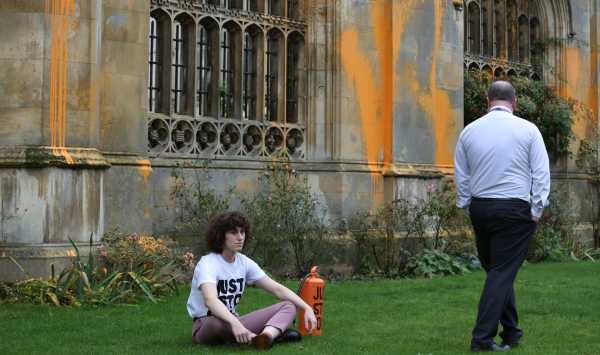Class resentment has become prevalent in higher education in the United States.

Credit: Martin Pope/Getty Images Loading the Elevenlabs Text to Speech AudioNative player…
Are you expecting trouble at your community college? Be careful. It’s only a matter of time. The Jacobins of today are professors, not students, and their radicalism will only intensify, getting worse before it gets better.
Alienated intellectuals seek to associate themselves with the oppressed and the suppressed, and now their interests may seem to overlap. Colleges and universities increasingly rely on adjunct faculty, and the pay of those who do most of the teaching is declining.
Twenty-five percent of the “contingent faculty”—part-time and non-tenure-track faculty—“depend on some form of government assistance,” a professor of English at Centre College notes in the journal Persuasion. More than two-thirds of faculty, instructors, and adjuncts “earn less than $50,000 a year.” This “precariat,” as it’s called, “now makes up more than 71 percent of all college faculty in the United States,” and “stories of professors finding themselves homeless are common.”
With assets of more than $8 billion and an endowment of $3.5 billion, Boston University relies on nearly 80 percent adjunct or temporary faculty “with little job security from year to year.” At Pennsylvania State University, where half of its teaching is adjunct, the starting annual salary is $35,000.
As our so-called institutions of higher learning come under increasing pressure to prepare students to earn enough to pay off their student loans, educators find themselves in the understandably painful position of helping their young charges earn more than they ever will. We have managed to convince Americans that higher education is necessary and deserving of all, and the purveyors of increasingly dubious credentials are beginning to resemble overpriced fast-food franchises more than prestigious institutions of academia.
It’s no wonder, then, that an “internal crisis” is growing. “I am one of many faculty who left their positions during the Great Resignation, partly because I felt corporate influence had come to dominate the profession I loved,” writes the frustrated author of Persuasion, “but also because the more I was pressured to prioritize doing good work for my students, the worse my own work looked by comparison.”
Subscribe Today Get Daily Emails Delivered to Your Inbox Email Address:
In addition, it must be cold comfort to be raising a generation of young people whose political views – judging by the results of the November elections – are considerably to the right of yours. This is especially true when the students in the lecture hall are considered budding fascists.
Trouble is brewing, and it would take a cold shoulder not to feel sympathy for the people who have dedicated their lives to what was once a respected and, when possible, well-paid profession. When college professors see themselves as mere “content providers,” as a professor friend of mine put it, it’s only natural that they would come to see themselves as, as the author of Persuasion put it, “an exploited workforce.”
This is not what M. Stanton Evans was talking about when he wrote “Campus Revolt,” but members of the faculty are becoming increasingly violent, and we can’t say we weren’t warned.
Sourse: theamericanconservative.com